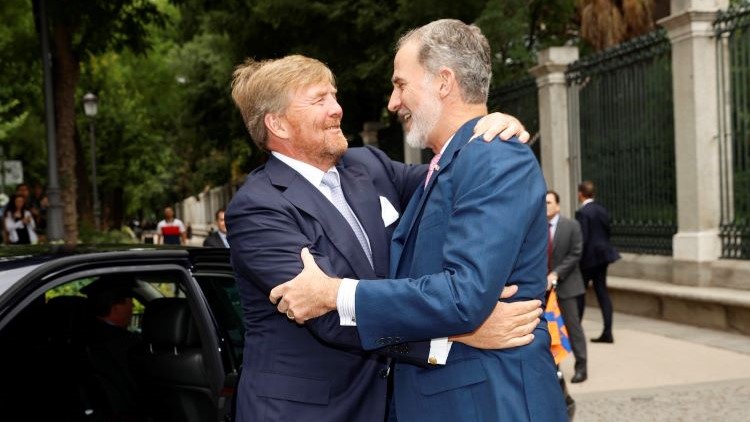The Diplomat
King Felipe VI received yesterday in Madrid King Willem-Alexander of the Netherlands, to whom he offered a lunch on the occasion of the celebration of the 375th anniversary of the establishment of diplomatic relations and with whom he agreed on the need to promote green hydrogen to promote energy autonomy in Europe “in these times of uncertainty and volatility”.
Willem-Alexander began yesterday a two-day working visit to Spain with the aim of strengthening the position of the two countries as pioneering partners in the green transition. To this end, the Dutch monarch visited Iberdrola’s hydrogen plant and the National Hydrogen Center, both in Puertollano (Ciudad Real), and will travel today to Algeciras (Cadiz) accompanied by Felipe VI to preside over the institutional act of presentation of the first green hydrogen maritime corridor between the ports of Algeciras and Rotterdam.
At noon yesterday, Felipe VI offered a lunch to Willem-Alexander at the Royal Botanical Garden, in Madrid, on the occasion of the celebration of the 375th anniversary of the establishment of diplomatic relations between the Kingdoms of the Netherlands and Spain. Among the attendees was the Third Vice-President of the Government and Minister for Ecological Transition and the Demographic Challenge, Teresa Ribera; who later met with the Minister for Climate and Energy Policy of the Netherlands, Rob Jetten, at the Ministry’s headquarters.
During his speech, Felipe VI said that the meeting between the two takes place on “a special occasion, as this year marks the 375th anniversary since our Kingdoms, Spain and the Netherlands, established diplomatic relations”, and highlighted the “deep historical ties” and “very positive relations” that both countries maintain, “covering virtually all areas, economic and commercial, security and defense, cultural and industrial”, and extending “to the energy sector”.
“We are here today to address an issue of vital importance for our future and that of generations to come: the development of a key energy vector to make the energy transition possible, viable, affordable and secure. That vector is renewable hydrogen,” he said. “The message coming from Europe is loud and clear: the development of the 21st century will depend on, and be driven by, renewables, efficiency, electrification and innovative technologies such as hydrogen, which already plays a prominent role in our energy system,” he continued.
Therefore, he warned, the “challenge ahead of us is to make the hydrogen we already use 100% renewable”, because “this commitment to renewable hydrogen responds to both environmental and strategic implications”. “In these times of uncertainty and volatility also in the energy sector, it is necessary to develop an energy transition that enhances our energy autonomy without creating new technological and material dependencies, that is, to enhance our strategic autonomy,” he added.
“To do this,” he continued, “it is essential to establish alliances between partner countries.” “Our country has shown itself to be on this path of collaboration and understanding, both with the agreement between Portugal, France, Germany and Spain for the development of H2MED throughout the Mediterranean and with the recent signing in February of the MoU between the Netherlands and Spain,” he recalled. With this agreement, signed last February 20 by Teresa Ribera and Rob Jetten to jointly boost the renewable hydrogen industry, “our two countries hope to deepen mutual cooperation for the development of a European hydrogen market, in line with the ambitions set out in the REPowerEU plan and to meet the objectives of the Paris Agreement,” he added.
Willem-Alexander
For his part, Willem-Alexander also recalled the celebration of “375 years of excellent relations” and affirmed that “it is gratifying that two countries that were at odds in the distant past now feel so united.” “Our relationship is stronger than ever,” he stated.
“The Netherlands admires the leading role Spain is playing in the transition to clean energy,” he continued. “Thanks to Spain’s efforts, we are on the cusp of a fundamental transition that will make Europe stronger and less dependent on others, make our economies cleaner, help us reach our climate goals and create a natural connection between southern and northern Europe,” he said. “The Spanish sun will soon warm the cold north and help our industry and transport sector to be greener,” the Dutch sovereign said. “For the first time in the EU we will produce, transport and trade sustainable energy through a green corridor,” he added.
“On a day like today, I believe we can afford to look to the future, to a Europe that is no longer dependent on energy from Russia, to a strong, autonomous and open Europe that runs on sustainable energies. In that Europe, Spain and the Netherlands will together provide a green lifeline,” he proclaimed. “And that is not all. Together we will connect Europe with the rest of the world through hydrogen trade routes, first with North Africa, but also with Latin America, the United States, the Middle East and Australia,” said Willem-Alexander.







